- Home
- John Bellairs
Drum, the Doll, and the Zombie Page 5
Drum, the Doll, and the Zombie Read online
Page 5
Johnny looked wildly around. He and Fergie were all alone on the rim of the lightly frozen pond, and the awful old woman stood between them and the only avenue of escape. "Wh-what do you want?" he stammered.
"Just to show you my handiwork—look at this!" She took something out of her coat pocket. It was a flattish cloth doll, about six inches tall. It wore a blue gingham dress and a white apron, and it had gray yarn hair done up in a bun. The face was just a pink blank, but the figure was somehow very familiar to Johnny.
To his surprise and horror, Fergie laughed—a long, raucous, mocking laugh. "Lady, that's th' worst-lookin' baby doll I've ever seen! If you're sellin' it, ya better find a couple of other customers—we don't have any little sisters, an' my buddy John and me are too old t' play with dollies!"
The awful old woman did not even look at Fergie as her slitted black eyes bored straight into Johnny's. "You recognize her, no? Your grand-mère? Perhaps she felt a little something wrong with her health yesterday, no? And perhaps if I stick a long pin in the dolly when the sickle moon is shining, something very bad happens to your grand-mère, no?" She stalked closer and Johnny flinched, but he had nowhere to run.
She came so close that he could smell her, a dusty, dry smell, like old leaves and crisp corn husks, and all the time she purred in her menacing voice. "You tell the old man, the old fox, that Mama Sinestra wants something, the thing that his miserable friend stole from her family. If she gets it, then poof! your grand-mère and the old fox's friend, they get better. If she does not get it— then you have been warned, no?" The evil smile left her face, and she snarled, "You have one week!"
Abruptly, the woman turned and waddled away. "Hey!" Fergie shouted after her, but she did not turn her head. "C'mon!" Fergie said to Johnny. "Let's follow her!"
Johnny grabbed his friend's arm. "No, Fergie, we can't! That's a voodoo doll of Gramma! We gotta tell th' professor about this right away!"
The woman vanished into a grove of birches as Johnny and Fergie ran in another direction. The cold air burned their lungs, and both were exhausted before they reached Fillmore Street, but neither slowed. They found the professor at home, and together they panted out their weird story to him in his cluttered study. The professor got up and paced for a few minutes, finally stopping beside the stuffed owl on its round stand. He absently reached out and straightened the owl's miniature Red Sox baseball cap, which had slipped to a rakish tilt. At last the old man shook his head and muttered, "Gentlemen, this is very, very bad news. John, I suspected that the old woman might somehow be involved in all this. Now it looks as if she is forcing my hand. Well, I have learned something about the St. Ives brand of evil witchcraft, so she may have a surprise or two coming. And she has very unwisely told us who she is."
"Huh?" said Fergie, scratching his head. "She called herself Mama Sinister or somethin' crazy like that. That doesn't sound like a real name to me, Prof!"
"It isn't a real name, Byron," returned Professor Childermass. "It is a nickname. You see, the current ruler of the Caribbean island of St. Ives is a dictator named General Hippolyte LeGrande. He maintains his rule through a combination of naked military force, intimidation, and witchcraft. And guess who the head witch is?"
"Ya mean this General Whosis isn't a witch himself?" asked Fergie.
The professor scuffed through the drift of graded papers that had built up into a dune at the foot of his desk. As he sank into his chair, he said, "I don't know if he is a witch or not, but he is not the witch that the people fear."
"So who is that?" asked Johnny.
"Her name is Madame Corinne LeGrande, and she is the general's mother," said Professor Childermass, leaning back in his chair. "Now here is the sixty-four-dollar question: What nickname do you think the people of St. Ives have given her?"
"Mama Sinestra," whispered Johnny.
"Precisely," said Professor Childermass, wrinkling his face into a disapproving frown. "And she seems to be quite a piece of work. Ruthless and intelligent and as wicked as they come." He swiveled his chair so that he could look out the window, toward the Dixon house across the street. Staring out, he gave a little start, and then, with a peculiar expression, he turned back to the boys. "Gentlemen, this is gravely important. Will you give me your absolute, ironbound promise that you will not speak of this Mama Sinestra person to anyone? I mean anyone at all, mind!"
"Sure," Fergie said at once. "Everybody'd think I was hallucinatin' if I tried to describe her anyway!"
Professor Childermass nodded. "And you, John? Will you give me your promise?"
Johnny blinked. "Well—sure, Professor, if you think it's—"
"Good," said the professor briskly. He pushed himself out of his chair, which squeaked loudly. "Now, Byron, you may stay and sample a batch of my special fudge that I made this morning. John, you had better go home right now."
Johnny could hardly believe his ears. "Go home? B-but—"
The professor held up a warning finger. "Home. Now. This very instant." His tone allowed no argument.
Johnny went downstairs feeling hurt. Hurt and puzzled. What was the professor hiding? He certainly had not sounded very friendly. Johnny opened the front door and froze in his tracks, staring across the street at what the professor must have seen from his study window. A yellow Chevrolet, one of Duston Heights' few taxis, was just pulling away from the curb in front of the Dixon house. Standing on the sidewalk was a tall, athletic man with a weathered, craggy face. He was wearing the blue uniform of an Air Force major.
Johnny's first, happy thought was, Dad's home!
And his second, despairing one was, Is Gramma dead?
CHAPTER SEVEN
But Gramma was fine, and she fussed over Major Harrison Dixon as if he were still her little boy. For a few hours that evening Johnny forgot all about being unhappy, and even his father's frequent worried looks at Gramma did little to bring his high spirits down. "Did you tell Mom about Thanksgiving dinner tomorrow, Pop?" asked Johnny's dad that evening.
"Yep, an' she can be mad at you for a change," said Grampa, grinning.
"Land sakes," said Gramma in a fussy voice. "I still can't see any sense in your orderin' a turkey an' trimmin's from the store. Don't you want some home cookin' for a change, Harry?"
Johnny's dad laughed. "Sure," he said. "But I want you to rest tomorrow too. So Pop and I will drive into town early and bring everything back, and the most you can do is to bake us a couple of cherry pies." He winked at Johnny. "Say, Old Scout, are those pies as good as I remember?"
Johnny blushed. "Old Scout" was a name his dad had always used for him. "They sure are," he said, and everyone laughed. It was a sound that he liked to hear.
The Dixons always had an early Thanksgiving dinner. The next day they all settled in around the table at two o'clock. Grampa gave thanks, and they dug in. Even though it had all come from a restaurant and not from Gramma's kitchen, the turkey, dressing, and trimmings tasted delicious. After dinner Johnny's dad insisted that he and Johnny would clear the table and wash the dishes, and they did. Then Gramma, who had been supervising, went upstairs for a nap, and Grampa turned on the radio to hear a football game. "Feel like taking a walk, Old Scout?" asked Major Dixon.
"Uh—sure," said Johnny. "Let me get my jacket." He ran upstairs, wondering what was up. Johnny suspected that his dad was worried about Gramma, because he had noticed how concerned the major seemed every time he glanced at the old woman. Johnny wished that he could tell his father the truth about Gramma's illness—but that would mean breaking his word to the professor. He hurried downstairs and found his dad waiting beside the front door.
Major Dixon was wearing civilian clothes, a red-plaid flannel shirt and Levi's, and he had pulled on one of Grampa's old jackets. Johnny thought he looked older and thinner than he remembered, but he still had the same short, light-brown hair, the same ironic gray eyes, and the same lopsided grin. "Ready to go?" he asked.
The weather had changed completely. They walked
down Fillmore Street toward town under a bright-blue sky and warm sunshine. All the shops were closed for the holiday, and Duston Heights looked like a ghost town. Johnny and his father walked to Johnny's school and went into the schoolyard, where they settled into the swings. Johnny began to swing, but his father just sat there. Johnny pumped a few times and felt the stomach-dropping thrill of a big swoop. For a moment he forgot all about Dr. Coote and the frightening Mama Sinestra. His father chuckled. "Swinging's like flying, you know," he said. "When I was even younger than you are now, I used to swing in the schoolyard. My toes would point up above the treetops, and I knew I wanted to be a pilot."
Johnny let the swing settle down. The chains creaked less loudly, the swing moved slower, until finally he was just sitting there beside his dad. "I'm glad you can be here through Christmas," he said. His father had told him that he would have to leave Duston Heights on December 26 to report back to his base on time.
For a few minutes Major Dixon did not respond. At last, in a serious voice, he said, "John, I want to talk to you."
Johnny swallowed. His dad had never used that man-to-man tone with him before, and Johnny sensed that something important was on his father's mind. "All right," he said.
Major Dixon smiled at him, and then he looked away. "Well, it's hard for me to put into words. It all started when your mother died. She was so young, and her death seemed so senseless that it made me angry. More angry than I had ever been. I wanted to hit back. Do you understand?"
Johnny's stomach felt fluttery, the way it had when he was swinging. "Yeah," he muttered. "I guess I sort of felt mad too."
His father nodded and sighed. "Well, unfortunately, you can't hit back at cancer. I had no way to let my anger out. Then the Korean War began, and the Air Force called me back. In an odd way that helped. I love flying, as you know. But there was something else, Johnny." Major Dixon bit his lip and then turned to his son. "You see, every time I fired at an enemy plane, or dropped a bomb, I felt that I was finally hitting back. It was crazy, but that was the way it seemed."
Johnny felt miserable. The warm, sunny day suddenly seemed cold and empty. He missed his mother terribly, and he always tried not to think too much about her, because remembering brought back the pain. But now he had to remember her. "I can understand," he said, feeling as if he were about to cry.
His dad reached out and put his hand on Johnny's shoulder, and that helped. In a soft voice Major Dixon said, "Well, that all changed after I got shot down. I was wounded, as you remember. It wasn't much, but it kept me from flying for a few months. When I got well, the Air Force needed me for transport service. I flew rations and equipment and supplies for a while—and I flew bodies."
"Bodies?" asked Johnny.
His dad took his hand off Johnny's shoulder. His craggy face had a look of deep sadness. "Yes. Bodies of the dead and bodies of the wounded. I evacuated our boys to Japan. It was—well, it was very rough, Johnny. I saw for the first time how the war was hurting so many young men. And that was when all my anger finally left me. When I saw all those boys, eighteen and nineteen years old, it suddenly hit me that I hadn't really been shooting at your mother's sickness. I had been shooting at kids. Sure, they were Korean kids, but they were no different from American kids. Once I understood that, all my hatred just dropped away."
Johnny could not think of anything to say. He stared down at the dirt beneath the swing, scuffing his toes back and forth, making little half-moon ruts in the damp, sandy soil.
"Now, John," his father said, "I want you to understand why I am still in the Air Force and not home with you. I have two reasons. First is money. I have established a special trust account for you, and I have been putting a lot of money into it. You have enough to go to any college you want. I've been sending Gramma and Grampa money to help them out but now I can send them more. If I stay in the Air Force for just a few more years, I can retire with a nice pension and never have to worry about working again."
"And you still get to fly," said Johnny.
Major Dixon nodded. "Yes, in the meantime I get to fly. Now, the second reason is much harder for me to put into words. When I saw those dead and wounded boys, I worried about you. Five or six years from now I don't want you flown back from some senseless war, all shot up. I'm not a very great thinker, Johnny, but it seems to me that our best hope of avoiding war is to keep our country so strong that no enemy will attack us. That is why I am training pilots for the Strategic Air Command. Can you understand that?"
"I think so," Johnny said.
His dad grinned and suddenly looked years younger, just the way Johnny remembered before he had gone to war. "You're smarter than I was at your age, Son. Well, that's what I had to tell you, and now I want to ask you something. You don't have to answer right away, but think about it. You see, I'll be eligible for early retirement in about eight months. I wouldn't get my full pension, just a small one, so I would have to keep working. However, Delta Air Lines has offered me a job. It's an up-and-coming company, and it needs good pilots. If you want, I can quit the Air Force then, and you can come and live with me again."
Johnny's heart thumped. He had not expected this. He started to say, "Yes, Dad!" Then he had second thoughts. What would saying "yes" mean? Johnny tried to control his voice. "Would we still live here, with Gramma and Grampa?" he asked.
"Well, no. You and I would have to move to Atlanta. And because I would still be away from home a lot, we would have to hire a housekeeper to stay with you."
Johnny looked away, past the school and toward St. Michael's Church. He thought of Father Higgins and Professor Childermass and Fergie and everyone else he knew in Duston Heights. He would have to leave them all behind. And what about Gramma and Grampa? It was a very difficult decision to make.
"Think it over, Old Scout," said his father. "I want to do what is best for you."
Johnny nodded, but he felt terrible. He did not want such a big responsibility, and he was confused. Confused and torn. On the one hand he had often dreamed of living with his father again, but on the other he was deeply attached to all his friends in Duston Heights and was a little afraid of moving to a strange place like Atlanta. He tried to imagine what it would be like there: hot and humid and very different, probably. The food would be unusual, and the people would talk with a strange accent. Worse, maybe they would not even like him. He had heard that Southerners often thought they were still fighting the Civil War and that they all hated "Yankees." Still, he would have a home with his father—it was all very bewildering.
"Ready to head back?" asked Major Dixon.
"Yeah," said Johnny. He slipped off the swing, and they walked up the long hill and turned onto Fillmore Street. "Dad," asked Johnny when they were still a few blocks from home, "what do you want to do?"
Major Dixon sighed. "Part of me wants you to stay here with Gramma and Grampa, because I worry and I know you will look after them for me. They are getting older, and Gramma's health is not very good. She looks so thin and pale. But another part of me wants you to live with me, so we can be together like a father and son should. It's all mixed up. I'll bet you figured that when you grow up, things are clear and you always know what to do."
"Yeah," admitted Johnny.
"Sorry, Old Scout. Sometimes it doesn't happen that way. Well, at least you'll have a month to think about what you would like."
As they approached his grandparents' house, Johnny saw Professor Childermass standing on the porch. The old man wore his disreputable topcoat and had his smashed-up fedora crushed onto his head, as if he had just returned from somewhere. His eyes lit up when he saw Johnny. "Ah, here you are!" he said. "Out for a constitutional?"
Major Dixon grinned. "Right, Professor. Say, why weren't you ever as friendly to me as you are to Johnny? You had me scared to death when I was in your history class."
"As well you deserved to be," growled the professor. "As I recall, Harry Dixon, you flunked the first examination in Western Civilization
rather spectacularly. And don't expect me to forgive you just because you wear that ridiculous military hardware on your shoulders now! As for Johnny, he is candid when he lacks information, and always asks for assistance instead of pretending to have knowledge he does not possess. Let me quote from your examination paper—ahem!—'The Peloponnesian Wars were fought between Athens and a great general named Peloponnesium.' Disgraceful!"
Major Dixon threw his hands up and laughed. "I surrender, Professor! My gosh, it's been almost twenty years since I wrote that exam—I've never seen anybody with a memory for other people's mistakes like yours."
"The price of wisdom is eternal vigilance against ignorance," paraphrased the professor pompously. "Now, if you will allow him, Johnny is invited over to my house to sample a special Thanksgiving cake I baked just for the occasion. If you are very lucky, I may even send a slice over for you."
"It's a deal," agreed Major Dixon as he went inside.
Johnny and the professor crossed Fillmore Street. The professor acted very mysterious until they were inside his house and he had shut the door.
Then he turned and said, "Johnny, I have been consulting a friend over at Miskatonic University. Dr. Andrew Armitage is a professor who has spent many years studying sympathetic magic, the kind of enchantments that use dolls and images. He has suggested a course of action that may remove the curse that the old woman placed on your grandmother. Now, I am going to ask you to do something that may sound just a little odd. Will you trust me?"

 The Curse of the Blue Figurine
The Curse of the Blue Figurine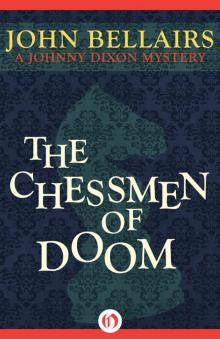 Chessmen of Doom
Chessmen of Doom Secret of the Underground Room
Secret of the Underground Room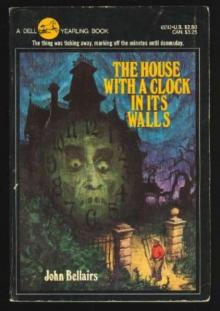 The House With a Clock in Its Walls
The House With a Clock in Its Walls The Vengeance of the Witch-Finder
The Vengeance of the Witch-Finder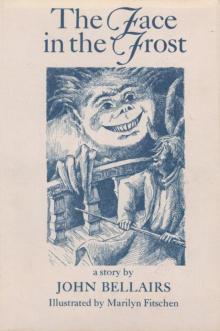 The Face in the Frost
The Face in the Frost Revenge of the Wizard's Ghost
Revenge of the Wizard's Ghost Spell of the Sorcerer's Skull
Spell of the Sorcerer's Skull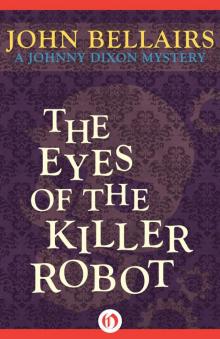 Eyes of the Killer Robot
Eyes of the Killer Robot Mummy, the Will, and the Crypt
Mummy, the Will, and the Crypt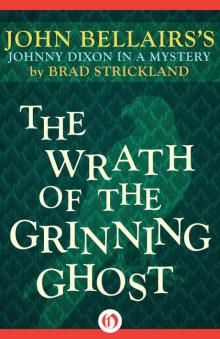 Wrath of the Grinning Ghost
Wrath of the Grinning Ghost The Mansion in the Mist
The Mansion in the Mist The Doom of the Haunted Opera
The Doom of the Haunted Opera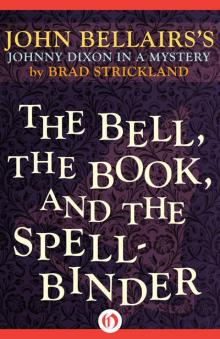 The Bell, the Book, and the Spellbinder
The Bell, the Book, and the Spellbinder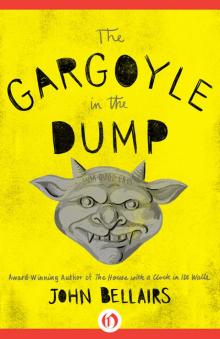 The Gargoyle in the Dump
The Gargoyle in the Dump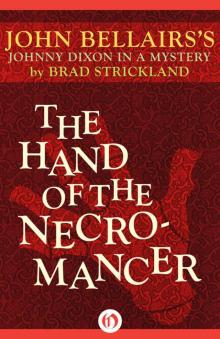 The Hand of the Necromancer
The Hand of the Necromancer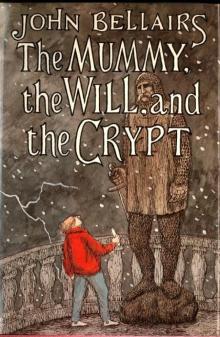 The Mummy, the Will, and the Crypt
The Mummy, the Will, and the Crypt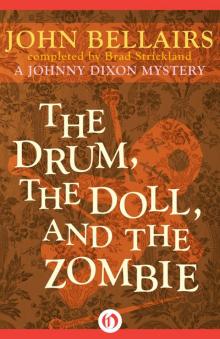 Drum, the Doll, and the Zombie
Drum, the Doll, and the Zombie The Specter from the Magician's Museum
The Specter from the Magician's Museum The Letter, the Witch, and the Ring
The Letter, the Witch, and the Ring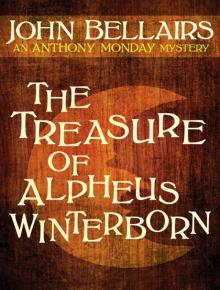 The Treasure of Alpheus Winterborn
The Treasure of Alpheus Winterborn The Dark Secret of Weatherend
The Dark Secret of Weatherend The Figure in the Shadows
The Figure in the Shadows